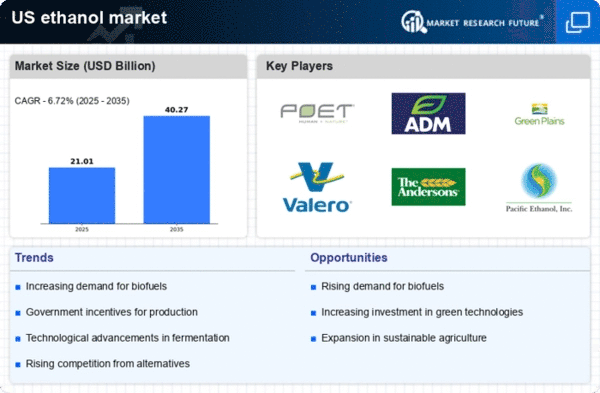The ethanol market exhibits a dynamic competitive landscape characterized by a blend of innovation, sustainability initiatives, and strategic partnerships. Key players such as POET LLC (US), Archer Daniels Midland Company (US), and Green Plains Inc. (US) are at the forefront, each adopting distinct strategies to enhance their market positioning. POET LLC (US) focuses on technological advancements in biofuel production, aiming to increase efficiency and reduce carbon emissions. Meanwhile, Archer Daniels Midland Company (US) emphasizes its extensive supply chain capabilities, leveraging its global reach to optimize production and distribution. Green Plains Inc. (US) is actively pursuing diversification into renewable chemicals, indicating a shift towards broader sustainability goals. Collectively, these strategies contribute to a competitive environment that prioritizes innovation and environmental responsibility.In terms of business tactics, companies are increasingly localizing manufacturing to reduce transportation costs and enhance supply chain resilience. The market structure appears moderately fragmented, with several key players holding substantial market shares while also facing competition from smaller, niche producers. This fragmentation allows for a variety of operational strategies, enabling companies to adapt to regional demands and regulatory changes effectively.
In October POET LLC (US) announced a partnership with a leading technology firm to develop advanced fermentation processes aimed at increasing ethanol yield. This strategic move is likely to enhance POET's production efficiency and solidify its position as a leader in sustainable biofuel technology. The collaboration underscores the importance of innovation in maintaining competitive advantage within the market.
In September Archer Daniels Midland Company (US) expanded its ethanol production capacity by 15% at its facility in Illinois. This expansion is significant as it not only meets the growing demand for renewable fuels but also positions the company to capitalize on potential regulatory incentives for cleaner energy sources. Such capacity enhancements reflect a proactive approach to market dynamics and consumer preferences.
In August Green Plains Inc. (US) launched a new line of renewable chemicals derived from its ethanol production processes. This initiative is indicative of a broader trend towards circular economy practices, where waste is minimized, and resources are reused. By diversifying its product offerings, Green Plains is likely to attract new customers and enhance its revenue streams, further solidifying its market presence.
As of November the competitive trends in the ethanol market are increasingly defined by digitalization, sustainability, and the integration of artificial intelligence in production processes. Strategic alliances are becoming more prevalent, as companies recognize the value of collaboration in achieving sustainability goals and enhancing operational efficiencies. Looking ahead, competitive differentiation is expected to evolve from traditional price-based competition to a focus on innovation, technology adoption, and supply chain reliability. This shift may redefine market dynamics, compelling companies to invest in cutting-edge solutions to maintain their competitive edge.

















